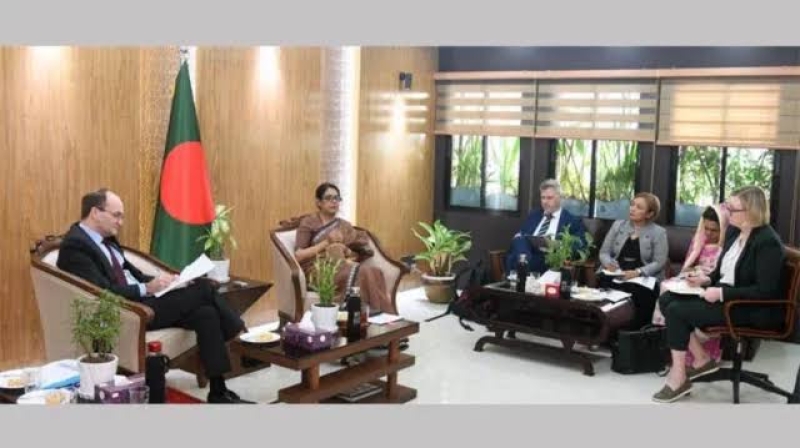- Dhaka seeks global pressure on Myanmar for lasting peace |
- BSEC Chairman’s resignation urged to stabilise stock market |
- Rain, thundershowers likely over 8 divisions: BMD |
- First freight train leaves Mongla carrying molasses |
- 2 dead, six hurt in Sherpur micro-autorickshaw-motorbike crash |
Bangladesh Needs Climate Support, Not Debt
Adviser Rizwana Tells Swedish Delegation

Bangladesh, one of the nations most affected by climate change, requires genuine support, not debt, said Syeda Rizwana Hasan, Adviser for Environment, Forests, and Climate Change.
She highlighted the importance of clearly defining climate finance to avoid burdening Bangladesh with additional loans. Rizwana made the comments during a meeting with a high-level Swedish delegation led by Dr. Jakob Granit, Director-General of the Swedish International Development Cooperation Agency (Sida), at the Bangladesh Secretariat on Monday, according to a ministry press release.
Swedish Ambassador to Bangladesh Nicolas Linus Ragnar Weeks and senior officials from both the ministry and Sida were also present.
The discussion focused on enhancing bilateral cooperation in sustainable development, climate finance, renewable energy, and water resource management. Dr. Granit reaffirmed Sweden’s commitment to supporting Bangladesh's transition to a greener economy, emphasizing the need for innovation and investment in sustainable sectors, including the ready-made garment (RMG) industry.
"We share a common goal of advancing Bangladesh’s sustainability agenda," Dr. Granit said, adding that Sweden is eager to collaborate with Bangladesh and European partners to promote job creation, trade, and climate-resilient investments.
He stressed the importance of securing climate finance to tackle issues like water resource depletion, pollution, and rising sea levels.
The meeting also explored opportunities for sustainable growth in the RMG sector, focusing on shared responsibilities between buyers and producers in ensuring fair labor practices and environmental sustainability. Additionally, the two sides discussed cooperation in areas such as plastic waste management, water resource mapping, and biodiversity conservation.
Both parties reaffirmed their commitment to strengthening cooperation and developing innovative financing mechanisms to support Bangladesh’s development goals.
Later, Rizwana also met with a Japanese delegation led by Matsuda Emiko, Deputy Director of the Climate Change Science and Adaptation Office at Japan’s Ministry of the Environment.

